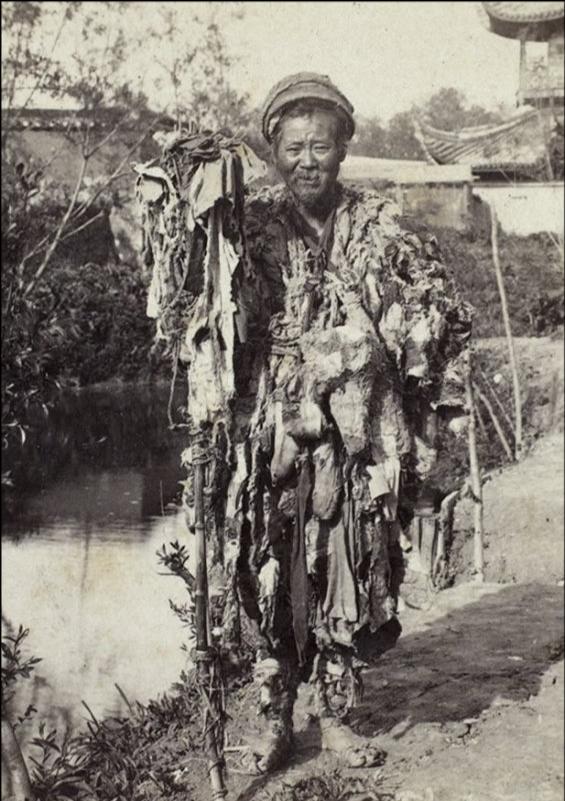Late Qing Dynasty old photos: The leader of the "Beggar Gang" is full of garbage, and the Lord of Zhizhou is full of style
Xiaobian has compiled 10 photos of the late Qing Dynasty and shown 10 scenes of late Qing life, which we can use to understand some details of that era.

The leader of the "Beggar Gang" near Shanghai Longhua Pagoda.
The "Gang of Servants" not only exists in martial arts novels, but also exists in history. In reality, beggars huddle together, not to compete for the status of the jianghu, but to demarcate the territory, only within this range of begging. The image of the gang leader is covered with garbage, and the image is difficult to accept. He managed the beggars around longhua pagoda, and the goods obtained by the people begging were uniformly distributed by him.
Postman in Shaanxi.
The parcels carried by the postman were sent from Xi'an to Lanzhou and Pingliang in Gansu. Of course, he did not go all the way, but was only responsible for the 200-kilometer journey from Xi'an to Changwu. Even so, he walked on foot with large items, an estimated 10-day round trip. Sleeping in the wind and eating, long distances, is not easy!
Beijing's husband, his clothes worn.
Every night, the husband knocks on the bamboo stick or gong to tell people what time it is, reminding them of fire prevention and theft. He would knock five times a night, every other hour, and by the time he knocked the fifth time, it was five days, when the chickens were crowing and the sky was about to light up.
Qing Army Green Battalion soldiers.
There were two kinds of standing armies in the Qing Dynasty, one was the Eight Banner Soldiers and the other was the Green Battalion Soldiers. By the late Qing Dynasty, the combat effectiveness of these two services was low, and they could not play the role of defending the country at all, and they lost more than they won in war. As a last resort, the Qing court also developed a local army represented by the Xianghuai Army and assumed the function of a standing army. On the eve of the fall of the Qing Dynasty, the Xianghuai Army was also in a state of twilight, and the imperial court formed a new army.
Skinny poor.
Previously, we only saw descriptions of the poor in the book, but this photo gives an intuitive presentation. Since the late Qing Dynasty, social unrest, frequent wars, and a variety of natural disasters have invaded each other, resulting in a difficult life for the people, and some people have lost their homes, been displaced, and have no food and clothing. The living conditions of the lowest characters are shocking.
Prisoners held in prisons.
The man leaned out and grimaced at the camera, as if he didn't care at all about what law he had broken and what punishment he was going to suffer.
Guyuan Zhizhou Wang Xueyi and subordinates group photo.
Wang Xueyi began to serve in Guyuan Zhizhou in 1905, during which time he emphasized agricultural work and products, and built an agricultural test field; planted more than 5,500 willows on the official road in the south of the city, and also encouraged the masses to plant trees; set up the "Guyuan Tobacco Cessation and Drug Administration Public Bureau" to investigate and prohibit the use of opium; set up the Guyuan Patrol Police General Bureau, serving as the superintendent of the guyuan police, and strengthening local public order; established a sanatorium to take in the elderly, the weak, the waste, the sick and the poor... He did a lot of good things for the local people, and people praised him as "a pillar of the country's different days, and a great man who was added to the eunuchs." It can be seen from the photos that Wang Xueyi is full of arrogance and is surrounded by a group of guards armed with weapons.
A dignified woman left a shadow.
Behind the woman hung a "dancing sword, giving a sword", the former sentence is from Li Bai's poem "Reward Cui Wulang Zhong", and the latter sentence is from Li Bai's other poem "Belu Song". The collection sentence has the spiritual meaning of "Shang Wu", which contrasts with the image of a feminine and weak woman.
The Qianmen City Tower, which is being rebuilt.
During the Boxer Rebellion in 1900, the Qianmen Castle Tower was burned down, and in 1902 Yuan Shikai, the governor of The DirectLy Under the Direct Subordination, and Yin Chenbi of Suncheon Province began to repair it at the behest of the imperial court, and it was not completed until 1906.
A couple.
The little-footed daughter-in-law walks slowly and rides a small donkey to facilitate the road; the husband holds a whip in his hand and drives the donkey. It is a harmonious picture of married life.